1943 in the United States
| 1943 in the United States | |
|---|---|
| Years: | 1940 1941 1942 – 1943 – 1944 1945 1946 |
|
| |
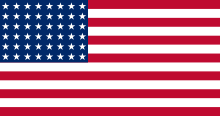 48 stars (1912–59) | |
|
Timeline of United States history
| |
Events from the year 1943 in the United States.
Incumbents
Federal Government
- President: Franklin D. Roosevelt (D-New York)
- Vice President: Henry A. Wallace (D-Iowa)
- Chief Justice: Harlan F. Stone (New York)
- Speaker of the House of Representatives: Sam Rayburn (D-Texas)
- Senate Majority Leader: Alben W. Barkley (D-Kentucky)
- Congress: 77th (until January 3), 78th (starting January 3)
Events
January
- January 4 – Culbert Olson, 29th Governor of California, is succeeded by Earl Warren.
- January 11 – The United States and United Kingdom give up territorial rights in China.
- January 14 – The Casablanca Conference, where Franklin D. Roosevelt becomes the first President of the United States to travel by airplane while in office (Miami, Florida to Morocco to meet with Winston Churchill to discuss World War II).
- January 15 – The world's largest office building, The Pentagon, is dedicated in Arlington, Virginia.
- January 23
- Duke Ellington plays at New York City's Carnegie Hall for the first time.
- Critic and commentator Alexander Woollcott suffers an eventually fatal heart attack during a regular broadcast of the CBS Radio roundtable program "People's Platform".
February
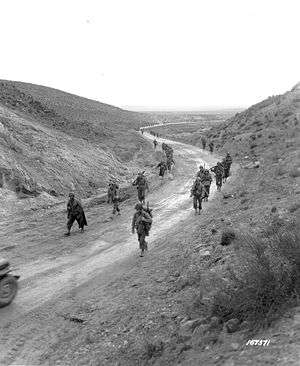
February 19–25: Battle of Kasserine Pass
- February 3 – The legendary Four Chaplains of the U.S. Army are drowned, when their ship (Dorchester) is struck by a German torpedo.
- February 5 – Howard Hughes's Western The Outlaw, starring Jane Russell, is released for a week prior to Motion Picture Production Code censors requiring its withdrawal from distribution.
- February 7 – WWII: It is announced that shoe rationing will go into effect in the US in two days.
- February 8 – WWII – Battle of Guadalcanal: United States forces defeat Japanese troops.
- February 11 – General Dwight D. Eisenhower is selected to command the Allied armies in Europe.
- February 14 – Battle of the Kasserine Pass: German General Erwin Rommel and his Afrika Korps launch an offensive against Allied defenses in Tunisia; it is the United States' first major battle defeat of the war.
- February 20 – American movie studio executives agree to allow the Office of War Information to censor movies.
- February 27 – The Smith Mine #3 in Bearcreek, Montana, explodes, killing 74 men.
March
- March 2 – WWII: Battle of the Bismarck Sea – United States and Australian forces sink Japanese convoy ships.
- March 4 – The 15th Academy Awards ceremony is held in Los Angeles.
- March 8 – WWII: American forces are attacked by Japanese troops on Hill 700 in Bougainville, in a battle that lasts five days.
- March 13 – WWII: On Bougainville, Japanese troops end their assault on American forces at Hill 700.
- March 26 – WWII – Battle of the Komandorski Islands: In the Aleutian Islands, the battle begins when United States Navy forces intercept Japanese troops attempting to reinforce a garrison at Kiska.
- March 31 – Rodgers and Hammerstein's Oklahoma! opens on Broadway, heralds a new era in "integrated" stage musicals, becomes an instantaneous stage classic, and goes on to be Broadway's longest-running musical up to that time (1948).
April
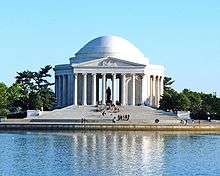
April 13: Jefferson Memorial dedicated
- April 13 – The Jefferson Memorial is dedicated on the 200th anniversary of Thomas Jefferson's birthday. The bronze statue is added in 1947.
- April 27 – The U.S. Federal Writers' Project is shuttered.
May

May 17: The Memphis Belle completes its 25th mission
- May 11 – WWII: American troops invade Attu in the Aleutian Islands, in an attempt to expel occupying Japanese forces.
- May 12 – The Trident Conference begins in Washington, D.C., with Franklin D. Roosevelt and Winston Churchill taking part.
- May 17
- The United States Army contracts with the University of Pennsylvania's Moore School to develop the computer ENIAC.
- The Memphis Belle becomes the first airplane in the 8th Air Force to complete a 25-mission tour of duty.
- May 19 – Winston Churchill addresses a joint session of the U.S. Congress.
- May 31 – The Zoot Suit Riots erupt between military personnel and Mexican American youths in East Los Angeles.
June
- June 22 – The U.S. Army 45th Infantry Division lands in North Africa, prior to training at Arzew, French Morocco.
July
- July 6 – WWII: Americans and Japanese fight the Battle of Kula Gulf off Kolombangara.
- July 10 – WWII – Allied invasion of Sicily: The Allied invasion of Axis-controlled Europe begins with landings on the island of Sicily off mainland Italy, by the U.S. Army 45th Infantry Division and a number of Allied paratroopers.
- July 11 – United States Army forces assault the village of Piano Lupo, just outside Gela, Sicily.
- July 21 – Release of the musical film Stormy Weather starring Lena Horne, "Bojangles" Bill Robinson, Cab Calloway, the Nicholas Brothers and other African American performers.
- July 24 – WWII: Operation Gomorrah begins: British and Canadian airplanes bomb Hamburg by night, those of the Americans by day. By the end of the operation in November, 9,000 tons of explosives will have killed more than 30,000 people and destroyed 280,000 buildings.
August
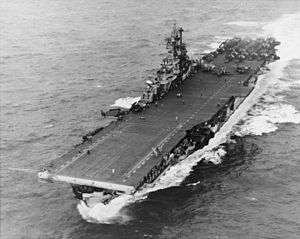
August 16: The USS Intrepid is commissioned
- August 1 – Operation Tidal Wave: 177 B-24 Liberator bombers from the U.S. Army Air Force bomb oil refineries at Ploieşti, Romania.
- August 3 – WWII: John F. Kennedy's PT-109 is rammed by a destroyer.
- August 5 – WWII: John F. Kennedy and crew are found by Solomon Islanders coastwatchers Biuku Gasa and Eroni Kumana with their dugout canoe.
- August 6 – WWII – Battle of Vella Gulf: Americans defeat a Japanese convoy off Kolombangara, as the U.S. Army drives the Japanese out of Munda airfield on New Georgia.
- August 14 – The Quadrant Conference begins in Quebec City; Canadian Prime Minister MacKenzie King meets with Winston Churchill and Franklin D. Roosevelt.
- August 16 – WWII: The USS Intrepid is commissioned.
- August 17 – WWII: The US 7th Army under General George S. Patton arrives in Messina, Sicily, followed several hours later by the British 8th Army under Field Marshal Bernard L. Montgomery, thus completing the Allied conquest of [[Sicily]cbn].
September
- September 5 – WWII: The 503rd Parachute Regiment under American General Douglas MacArthur lands and occupies Nadzab, just east of the port city of Lae in northeastern Papua New Guinea.
- September 7 – A fire at the Gulf Hotel in Houston, Texas, kills 55 people.
- September 8 – United States General Dwight D. Eisenhower publicly announces the surrender of Italy to the Allies.
October
- October 1 – WWII: American forces enter liberated Naples.
- October 6 – WWII: Americans and Japanese fight the naval Battle of Vella Lavella.
- October 28 – The alleged date of the Philadelphia Experiment, in which the U.S. destroyer escort USS Eldridge was to be rendered invisible to human observers for a brief period.
- October 30 – The Merrie Melodies animated short Falling Hare, one of the few shorts with Bugs getting out-smarted, is released in the United States.
November
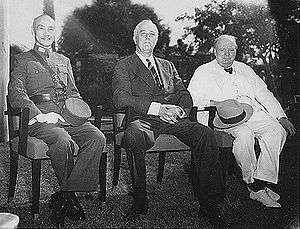
November 22: Cairo Conference
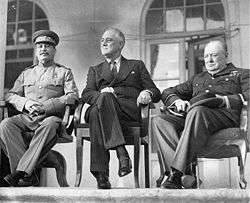
November 28: Tehran Conference
- November 1 – WWII – Operation Goodtime: United States Marines land on Bougainville in the Solomon Islands.
- November 2 – WWII: In the early morning hours, American and Japanese ships fight the inconclusive Battle of Empress Augusta Bay off Bougainville.
- November 14 – Leonard Bernstein, substituting at the last minute for ailing principal conductor Bruno Walter, directs the New York Philharmonic in its regular Sunday afternoon broadcast concert over CBS Radio. The event receives front page coverage in the New York Times the following day.
- November 16
- WWII: After flying from Britain, 160 American bombers strike a hydro-electric power facility and heavy water factory in German-controlled Vemork, Norway.
- WWII: A Japanese submarine sinks the surfaced U.S. submarine USS Corvina near Truk.
- November 20 – WWII: Battle of Tarawa: United States Marines land on Tawara and Makin atolls in the Gilbert Islands and take heavy fire from Japanese shore guns.
- November 22 – WWII: War in the Pacific: U.S. President Franklin D. Roosevelt, British Prime Minister Winston Churchill, and ROC leader Chiang Kai-shek meet in Cairo, Egypt, to discuss ways to defeat Japan.
- November 25 – WWII: Americans and Japanese fight the naval Battle of Cape St. George between Buka and New Ireland.
- November 28 – WWII – Tehran Conference: U.S. President Franklin D. Roosevelt, British Prime Minister Winston Churchill and Soviet leader Joseph Stalin meet in Tehran to discuss war strategy (on November 30 they establish an agreement concerning a planned June 1944 invasion of Europe codenamed Operation Overlord).
December
- December 2 - Fifteen atomic scientist, including soviet spy Klaus Fuchs, arrive from Britain to join the US atomic research project.
- December 3 – Edward R. Murrow delivers his classic "Orchestrated Hell" broadcast over CBS Radio, describing a Royal Air Force nighttime bombing raid on Berlin.
- December 4 – The Great Depression officially ends in the United States: With unemployment figures falling fast due to World War II-related employment, U.S. President Franklin D. Roosevelt closes the Works Progress Administration.
- December 24 – WWII: U.S. General Dwight D. Eisenhower becomes the Supreme Allied Commander in Europe.
Ongoing
- World War II, U.S. involvement (1941–1945)
Births
- March 12 – Nosson Tzvi Finkel, Chicago-born Israeli rabbi (d. 2011)
- March 31 – Christopher Walken, actor
- April 30 – Bobby Vee, pop singer (d. 2016)
- May 3 – Jim Risch, U.S. Senator from Idaho from 2009
- May 11
- Clarence Ellis, computer scientist and academic (d. 2014)
- Matthew Lesko, author
- May 12 – Linda Dano, actress and author
- May 16 – Dan Coats, U.S. Senator from Indiana from 2011
- June 6 – Ken Hatfield, American football player and coach
- June 17 – Newt Gingrich, 50th Speaker of the United States House of Representatives
- July 22 – Kay Bailey Hutchison, U.S. Senator from Texas from 1993 to 2013
- July 28 – Bill Bradley, U.S. Senator from New Jersey from 1979 to 1997
- August 27 – Bob Kerrey, U.S. Senator from Nebraska from 1989 to 2001
- October 3 – Jeff Bingaman, U.S. Senator from New Mexico from 1983 to 2013
- October 5 – Ben Cardin, U.S. Senator from Maryland from 2007
- November 10 – Saxby Chambliss, U.S. Senator from Georgia from 2003
- November 13 – Jay Sigel, golfer
- December 2 – Wayne Allard, U.S. Senator from Colorado from 1997 to 2009
- December 11 – John Kerry, U.S. Senator from Massachusetts from 1985 to 2013
Deaths
- January 5 – George Washington Carver, African American botanist (b. 1864)
- January 23 – Alexander Woollcott, critic (b. 1887)
- February 11 – Bess Houdini, stage assistant and wife of Harry Houdini (born 1876)
- April 4 – David Roitman, Russian-born American cantor (b. 1884 in Russia)
- May 22 – Helen Herron Taft, wife of William Howard Taft, First Lady of the United States (born 1861)
- September 15 – John Flammang Schrank, attempted assassin of Theodore Roosevelt (born 1876)
- November 22 – Lorenz Hart, lyricist (b. 1895)
- December 14 – John Harvey Kellogg, doctor (b. 1852)
- December 15 – Fats Waller, African American jazz pianist (b. 1904)
See also
External links
-
 Media related to 1943 in the United States at Wikimedia Commons
Media related to 1943 in the United States at Wikimedia Commons
This article is issued from Wikipedia - version of the 11/17/2016. The text is available under the Creative Commons Attribution/Share Alike but additional terms may apply for the media files.